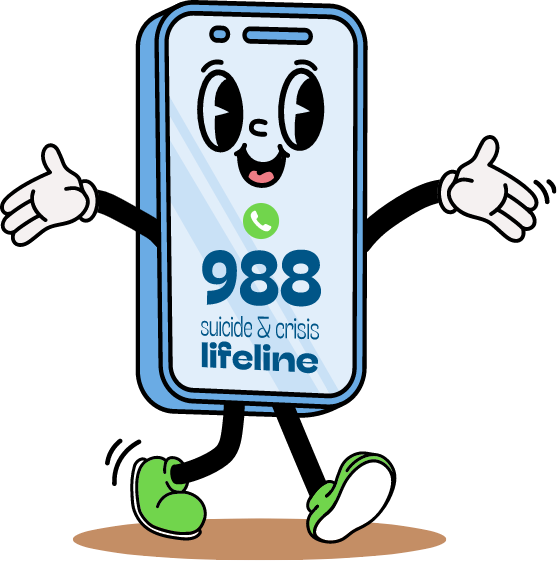They may not always show it, but odds are that your child or a youth in your care wants you to take an interest in their life.
Make sure they know they can “bother” you with whatever’s weighing them down.
Speak with a trained counselor who will listen without judgment and provide support 24/7.
Call or text 988 | Chat at 988lifeline.org/chat/
Free. Open 24/7. Confidential. Created for 2SLGBTQ+, ages 13–24.
Call 1-866-488-7386 | Text START to 678-678 | Chat at chat.trvr.org
Speak with a trained teen listener who understands what it’s like to be a teen.
Call 1-800-852-8336 (6 PM–10 PM PT)
Text TEEN to 839863 (6 PM–9 PM PT)
Want more options? See full list
They may not always show it, but odds are that your child or a youth in your care wants you to take an interest in their life.
Make sure they know they can “bother” you with whatever’s weighing them down.
Call the Suicide and Crisis Lifeline at 988 any time (24/7) to get help right away. Get more resources.
Reassure your child that they did the right thing in telling you. They may feel like they’re betraying their friend’s trust, but they need to know that they are actually potentially saving their life.
Sometimes young people hesitate to come to a parent or caregiver with their problems because they are afraid of bothering you. Make time to talk when you can give them your full attention.
Asking questions won’t put the idea in their head. Your child may be relieved that you brought it up.
Take action if you notice these warning signs in friends or family. They might show up in person or on social media:


We know, it can be tricky to tell the difference.
If you answer yes to any of these questions, you should have a conversation with the young person in your life — especially if the behavior is new, has increased, or seems related to a painful event, loss, or change:
Has your youth lost interest in activities like school, sports, video games, hobbies, or hanging out with their friends?
Any dramatic mood changes?
Are they angry, agitated, or irritable in a way that seems out of character or context?
Are they unusually tired?
Any unusual neglect of their personal appearance?
Do they seem to feel sad, worthless, or hopeless? This could show up as a preoccupation with song lyrics that suggest life is meaningless.
Do they frequently complain about headaches, stomachaches, or fatigue?
Have you noticed a change in appetite? Dramatic changes in weight, anorexia, or bulimia?
Have they been giving away belongings they care about?
“I want us to be able to talk about all the things, even the ones that feel difficult to say out loud. How are things going for you?”
No. According to research, asking about suicide does not put the idea into a young person’s mind. In fact, talking openly about suicide shows young people that it isn’t taboo. It creates a safe environment for them to ask their own questions and express how they’re feeling.
Prepare yourself emotionally in case they say yes.
Call the 988 Suicide & Crisis Lifeline together.
If your community has one, go to a walk-in mental health stabilization center, where support is available to help your teen through their immediate crisis and plan for next steps.
You can also bring them directly to the emergency room if you’re worried about keeping them safe at home.



Learning skills for how to handle their stress and use self-care tools will also serve them for their whole life. See more coping skills here.
Most importantly, make sure your child knows they can “bother” you any time they have something on their mind. And then be sure to listen.
You can talk about mental health and suicide at early ages, keeping in mind the need to use age-appropriate language for your child (see our tips below). Having these open conversations before a crisis can help prevent a crisis from happening, or make a crisis more manageable.
Trust your instincts: If you notice a warning sign — especially if it’s new, increased, or linked to a painful event — it’s time to have a conversation.
At this age, honesty about the topic is best. However, you’ll want to avoid providing too much information that the child may not be ready for. Allow your child to lead the conversation with their questions and avoid giving the impression that suicide is something kids should not think or talk about. It’s important to emphasize that suicide is not a solution to problems, that there are always other choices, and that most people do get help.
By middle school, many youth will have experienced scary, complicated emotions. Start the conversation by asking them what they have heard about suicide. Correct any misinformation and clearly ask if they have thoughts about suicide, or if any of their friends have talked about it. You want them to know that it’s safe to be direct and that talking about mental health and suicide is okay. Pre-teens or “tweens” are dealing with many stressors in their lives, so be sure to ask a lot of follow-up questions that encourage them to continue to explore their thoughts and feelings, and get them used to talking about their moods and struggles. Let them know everyone feels sad or disappointed sometimes, and that help is always here.
It’s likely your child knows someone with mental health challenges. Let them know mental health struggles are common and treatable, and not a sign of weakness. Emphasize that they can always talk to you and that help is available.
At this age, teens want to be addressed like an adult, are ready to explore pros and cons, and are eager to critically evaluate and form their own conclusions. Ask questions that show you respect them and avoid a one-sided conversation that feels more like a lecture.
Don’t rush to correct their perspective or manners — instead, focus on active listening and open-ended questions. Teens respond much better to a give-and-take dialogue. Give truthful and realistic answers to their questions. You can also offer them new information that they can absorb and use to fuel their own outlook and beliefs.
By the time a teen is 14 or older, the risk of suicide has increased considerably. Make sure they know what to do if they or someone they know experiences suicidal thoughts, including quickly reporting to a trusted adult or reaching out to 988 or other crisis lines. Help them understand that being a true friend means not keeping secrets that could lead to someone dying. Make sure they know about support resources like 988 for themselves and friends.

As a parent or caregiver, there may be no worse thought than the possibility of losing your child to suicide. Let them know you are there for them and most importantly, know that you are not alone in supporting a youth in your care.

Here are some ways you can support your child:
Be sure to also take care of yourself while dealing with this stressful event.
Positive Childhood Experiences (PCEs) help kids and teens have strong relationships, feel like they belong, and learn how to handle life’s ups and downs.

You don’t need grand gestures to make a difference; it’s the everyday moments that matter. Together we can all create Positive Childhood Experiences, which can help kids deal with life’s stresses now and in the future.
They can also serve as protective factors against suicide.
When kids feel supported by parents, caregivers, or other supportive adults in their families or communities, they grow up healthier and more confident.
Even the smallest acts make a lasting impact.

Adverse Childhood Experiences (ACEs) are stressful or potentially traumatic experiences that happen before the age of 18.
Examples of ACEs include having a caregiver who struggled with mental health or substance use, witnessing domestic violence, or experiencing abuse or neglect. These can have a lasting impact well into adulthood, on a person’s mental and physical health, relationships, and how they show up at work and school.
The good news: it’s never too late to get support and begin healing. Stress management activities like getting a good night’s sleep, exercise, and talking to a mental health professional can help.
Also, Positive Childhood Experiences (PCEs) — such as supportive relationships, a feeling of belonging and community, and quality time with a caring adult — can counteract the effects of ACEs. You can learn more about PCEs on the CDPH PACEs webpage.
Remind young people in your life that they are never a bother! Whether you’re a parent, caregiver, ally, or community member, you can help them heal — by listening, caring, and offering a safe place for them to process tough experiences and complex feelings. It can make a big difference for their future. To learn more about ACEs and how they can impact young people in your care, please visit livebeyondca.org.